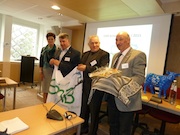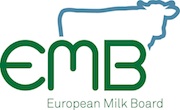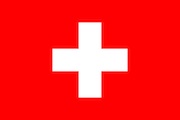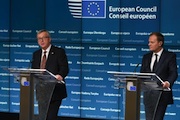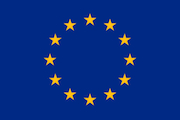EMB Newsletter May 2015
Newsletter as PDF
Contact
EMB - European Milk Board asbl
Rue de la Loi 155
B-1040 Bruxelles
Phone: +32 - 2808 - 1935
Fax: +32 - 2808 - 8265
Dear dairy farmers and interested parties,
The Association of Milk Producers in the Po Valley (APL - Associazione Produttori Latte della Pianura Padana) will be exhibiting dairy products, sausages and more goods from their own farms together with Copagri at EXPO in Milan. For six months - from May to October 2015 - buyers from all over the world will have the opportunity to sample for themselves products “Made in Italy” that are the fruit of our labour on our own farms. The days will be enlivened with programmes like show cooking with famous chefs. Visitors to the APL pavilion can try homemade ice-cream or a pizza made by Giorgio Sabbatini, the renowned World Champion Pizza Chef of 2012. “Fair Milk” will also be a major feature at this EXPO, being offered in a 200-ml small size as a fresh, light take-away snack. The “Buono e Onesto” project (which is what Fair Milk is called in Italy) is opening up new horizons, enabling us to approach key population groups like schools, with a project explaining and giving information on a good, healthy, natural diet.
The EXPO events include a conference on “Fair Milk” on 23 June attended by representatives of the European Milk Board, producers from home and abroad, key figures in the milk and dairy sector and the trade, plus representatives from the countries that market “Fair Milk”. They will be displaying their products under the “Fair Milk” label and have the opportunity to explain the market for “Fair Milk” in their own country. The event will also feature the presentation of the Golden Faironika, a prestigious award for persons who have performed a great service to sustainable food production.
From 24 to 28 June, APL will be staging a “Fair Milk” week in collaboration with the European Milk Board. The countries involved in the project will be able to display and present their products during the pavilion’s opening hours.
The big final event is the World Milk Summit, scheduled for Thursday 15 October 2015, which will be attended by members of the European Milk Board, politicians and farmers from home and abroad. Here the representatives will be discussing the various economic ideologies, the diverse milk and dairy systems, and speculation in the food sector. The developing nations will also be represented, contributing the example of their markets to the discussion. The theme of the debate is: “What should the policy for the milk and dairy sector be?”
The situation on the dairy market makes clear that decision makers need to do something. In Italy there is no let-up in the milk and dairy sector crisis. The average price of raw milk is still below 36 cents a litre and has fallen since the beginning of the year and compared to last year. The average cheese prices have not changed since the beginning of 2015, but are below the level of previous years.
Finally, I wish to take this opportunity to welcome the two new members of the European Milk Board – the associations from Lithuania and Latvia.The Baltic States suffered direct consequences of the Russian import ban and are the most affected by the crisis. Milk prices have reached an all-time low.
Together we are stronger and together we will keep on fighting for our future!
Roberto Cavaliere, EMB Board Member and president of APL Italy
EMB – new member organisations from Latvia and Lithuania
The CoR’s position embraces the EMB’s Market Responsibility Programme
Milk crisis in Switzerland – now the politicians are starting to stir!
TTIP: Are the politicians caving in to big business?
Interview with Sagari Ramdas - Food Sovereignity Alliance, India
News from Brussels
EMB Diary
The EMB Board’s key dates in May 2015:
- 05.05.: Meeting with the Polish Minister for Agriculture + dairy farmer organisation
- 05.05.: Civil dialogue meeting "International aspects"
- 06.05.: Meeting with the Czech Minister for Agriculture + national organsiations
- 06.05.: Civil dialogue meeting "Rural development"
- 12.05.: Civil dialogue meeting "Milk"
- 13.05.: EMB Board Meeting
Impressum
European Milk Board asbl
Rue de la Loi 155
B-1040 Bruxelles
Phone: +32 2808 1935
Fax: +32 2808 8265
E-Mail: office@europeanmilkboard.org
Website: http://www.europeanmilkboard.org

